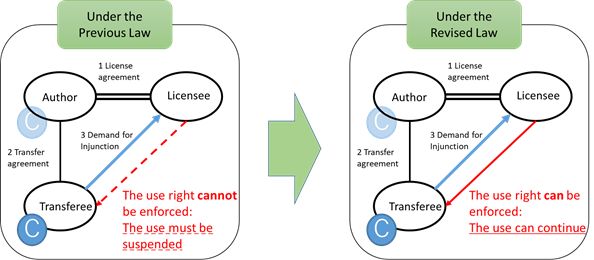In this article, we would like to share some points to keep in mind when signing a copyright agreement in Japan.
"Transferring all copyrights" will not be enough
Copyrights include various rights for exploiting a work, and an author can transfer all or a part of the rights. Copyrights include the following rights, namely, a reproduction right, a performing right, a screen presentation right, a public transmission right, a public communication right, a recitation right, an exhibition right, a distribution right, an ownership transfer right, a rental right, a right of creation of a derivative work, and a right of exploitation of a derivative work. How should be an agreement made in order to obtain all these rights from the author? Obviously, it is not enough to simply state "transferring all copyrights" in the agreement since the right of creation of a derivative work and the right of exploitation of a derivative work cannot be transferred unless the purpose of transfer of these rights is particularly described in the agreement, pursuant to the provision set forth in Paragraph 2, Article 61 of the Copyright Act.
The right of creation of a derivative work is a right to translate, arrange musically, transform, dramatize, cinematize, or otherwise adapt a pre-existing work. The transformation shall be deemed as transforming expression form of a work or transforming expression level of a work such as transforming a piece of photography to a painting or transforming a planar map to a 3D image. The adaptation shall be deemed as creating a new work based on a pre-existing work by making amendments and/or changes to its specific expression while preserving its essential characteristics of expression such as making a game based on a novel, transforming an adult-oriented novel to material for children, or upgrading a software version.
The right of exploitation of a derivative work is a right which belongs to the original author for use of a derivative work such as a translation or adaptation. A person who uses a derivative work (for example, copying a derivative work) must receive permission not only from the author of a derivative work such as a translator or an adaptor, but also from the original author.
Non-transferable Rights
Apart from copyrights, there are non-transferable rights that belong to an author, which are the author's moral rights. The following three rights are protected by the author's moral rights:
- Right to make a work public:
The right to make a decision on whether to publicize own unpublished work - Right to display the author's name:
The right to make a decision on whether to display the author's name on own work and the name to be displayed. - Right to maintain integrity:
The right to prohibit the modification of the title or content of own work against the author's intent
In order to avoid a dispute over these rights, the agreement should state "no use of author's moral rights". This statement could reduce the risk of infringing on the author's right to maintain integrity for modified work of which copyright is obtained.
A retweet may infringe moral right of author – a dispute over the moral rights of an author
There was a dispute case over the right to display an author's name protected under the moral rights of an author. Though unrelated to copyright agreements, this article will include notes on Twitter which many people use today.
The Supreme Court handed down a decision that a Twitter user who had posted a retweet infringed upon the right to use the author's name. The user had retweeted a picture (originally with the author's name) which had the author's name removed in accordance with Twitter's specifications. This raised an issue regarding whether the non-display of the author's name, which was caused by the display of the partially trimmed picture, corresponds to infringement. This case was filed to the Court as a civil action where the author requested Twitter, Inc. to disclose information of the Twitter user who posted the tweet with the picture without their permission as well as the user who retweeted the post based on the infringement. Twitter, Inc. was ordered to disclose the information of the users to the author, accordingly.
Allowing Continuous Use by Licensee under the Revised Law
It should be noted that the Copyright Act is revised almost every year in Japan. We would like to introduce the amendment regarding the handling of a licensee after a transfer agreement is concluded.
Previously, after the conclusion of a transfer agreement between an author and a transferee, the licensee was not able to continue using the work if the transferee requests that a licensee, who concluded a license agreement with the author, to suspend use of a work. The amendment now allows a licensee to continue using the work after its transfer (Article 63bis of Copyright Act). No registration procedures are required for the continuous use in such a case. Consequently, presence of licensees must not be overlooked in the transfer agreement.

Source: Agency for Cultural Affairs, Explanatory material of the law to amend the copyright act and the special provisions on the registration of works of computer programming
The content of this article is intended to provide a general guide to the subject matter. Specialist advice should be sought about your specific circumstances.
